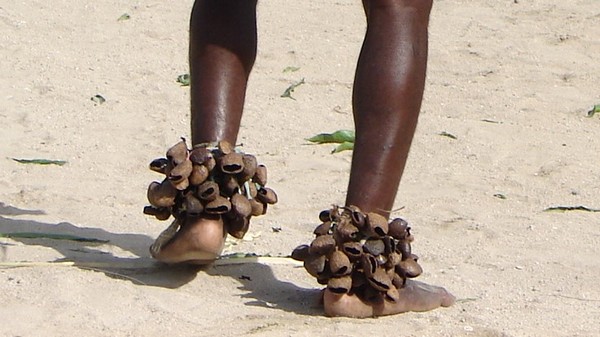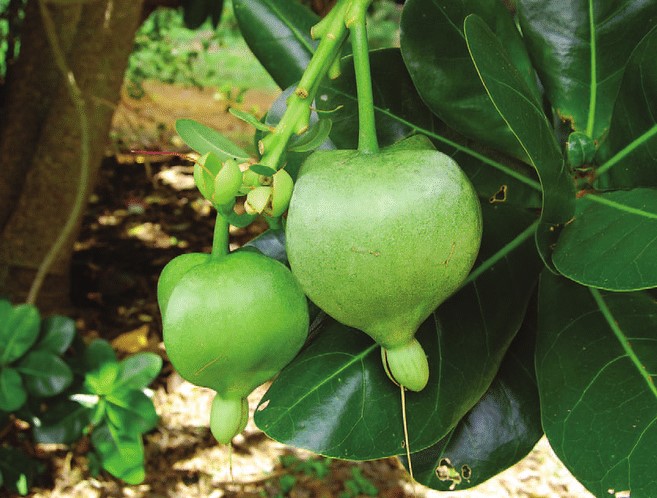POc*puaq
plantfruit
| wa widofruit of Barringtonia |
| Lekele i-nge wa vede.Flying-foxes chew fruits of pandanus. |
~wablei (i·)waᵐblei
~wabilei
verb, transitive
tease ‹s.o.› with jokes
| Ni-wablei eo.I was just teasing you. |
| Ngele i-wablei kupa?Who is teasing us? |
wabulubu waᵐbuluᵐbu
wablubu
adjective
shaperound, spherical
| dere wablubu [round tuna] bonito fish |
| kasule wa-wabulubu [round-fruit creeper] calabash |
| Li-la voko waboro li-ia aero ñei wablubu.resultative constructionWe use black stone to polish cone shells into a round shape. |
~waga (i·)waᵑga verb, transitive
distribute, hand out ‹food, presents+› to several people
| Li-waga none pe kape le-te pe l-anu kava ne.They handed out food for those who were having kava. |
| Ni-ko me n-ajau kopi abia me le-waga i-dai kulumoe iakapa Banie.I want to print many copies, so I can distribute them across our whole Vanikoro territory. |
waiero wajero noun
Sea
wave, surf of the sea
| Waiero li-bo voko i-wapio.The waves have piled up the stones together. |
~waivo (i·)waivo verb, transitive
| Ene li-waivo ene ne “National University” ne Solomon islands.I did my studies [lit. They instructed me…] at the National University in the Solomon islands. |
| Uña teliki samame dapa wopine li-waivo uña dapa gete ñe telepakau akapa.The chiefs and the elders teach youngsters about our culture. |
| Teliki Makumoso Banie i-waivo idi mwaliko ñe telepakau, ñe maluo.The Elder God Banie instructed humans with culture and life. |
| I-waivo idi pe li-vo mwoe.He taught people how to build houses. |
Aadjective
good
1 – good, pleasant, beautiful
| Aña wako tadoe!This is incredibly delicious! |
| Li-romo ngiro wako.They found the wind to be fine. |
| Ni-romo makone iaipa wako po pi-pinoe.[I see your dances (to be) good] I'm really enjoying those dances you've been performing. |
2 – useful; of proper conception or quality
| Tongolukilo ponu wako peini basa idi i-meli.This medicinal plant is useful against headaches. |
3 – morally good, of good character; easy-going
| Ini i-vete piene wako se idi abia.She talks easily to everybody. |
6 – s.o.in a good state, healthy
| Oie ini ka wako.She has nicely put on weight. [her size is healthy now] |
Bpostverb
1 – properly, well
| Ka i-vilu, ia mamote i-vete piene wako tae.She can walk already, but she doesn't speak well yet. |
| Ni-vodo ni-ko eo ka uña damiliko iono pi-te wako.I hope that you and your children are well. |
synonym~ejau ⓑ
Cinterjection
1 – alright! Expression of approval
| Li-watebo ñei li-wamabu da, da ai’ iape me ete iape da la-ko: “O, wako!”They asked the question, put out their request, and both parents said “It's alright.” |
Discourse
2 – foll. by hortative sentencealright, so…! Interjection used to introduce a new action
| Wako le-le le-katei!canoeAlright, let's drag it now! |
synonymio
Dcoordinator
Discourse
1 – in tail-head linkage constructionsonce (action V) was finished, then…
| U-vongo wako l-ab’ la-le.Once you've eaten, we'll go. |
Anoun, relational
side of ‹s.th.›
waluko ote waluko ote noun
Music
sago trunka membranophone drum made of a sago tree; not native from Vanikoro, but found in islands further West
plural senses.th.small – for a plurality of referents (opp. apilaka, ‘small: Singular’)
| uña dameliko wamtakasmall children |
| Li-apilo vekai wamtaka, biouro iape nga ne!They made small puddings, but still they were as long as this! |
| Kape le-toe langasuo peini, ka nengele wamitaka.canoeYou cut out the big rail, and then the smaller pieces. |
| Kava li-totoe, li-wete me wamtaka.causative me ② ⓐYou dice up the kava, you grind it into small bits. |
| Savene, uña kiñe po li-vei ñi wamtaka tamwase.‘savene’ matsSavene mats have their fibers woven very delicately. |
~wamu (i·)wamu
Averb, transitive
hide ‹s.th.› (from s.o., mina)
| Ka a-wamu labaro 'none vele?Where did you hide my shoes? |
Averb, transitive
1 – heap up, pile up ‹s.th.› in large amounts
| Li-le li-toe longe ne ngogoro ka li-tabe li-kamai li-wapio i-vio ne moe.They went to chop firewood in the bush, then brought it back and piled it up in the house. |
| Waiero i-bo voko i-wapio.The waves have piled up the stones together. |
| Li-wapio viko li-lui kape le-puie li-kilasi tadoe adapa.ritualThey piled up shellmoney, and began invoking their gods. |
~wasi (i·)wasi verb, transitive
| Kape u-wasi uña ngaten’ na po pi-wasi ñ’ eo na.You will reveal all those ideas that we just revealed to you. |
| Ni-ko ne-wasi kaipa ñe Toplau mwa gete na.I wanted to tell you guys about the Men's Initiation house. |
~wasu (i·)wasu verb, transitive
1 – make ‹things› come back in order: tidy, straighten, fix ‹s.th.›
| Ne-wasu ngaten' enaka i-vio.I'll tidy up my stuff. |
4 – arrange, organise ‹s.th.›
| U-wasu kuo re u-min' ene.Please could you arrange for me a trip on that boat? |
5 – slgfix ‹a girl›: arrange a romantic relationship with ‹a girl› on behalf of s.o.; betroth ‹a girl› to a boy
| U-le u-wasu emele re u-min' ene![Go fix that girl for me] Please go and connect me with that girl! |
| Men' iape kape i-te ne toplau, ra basavono po kape ai' iape i-wasu emele i-min' ini.The son will live in the Men's house until the day when his father arranges a wife for him. |
~wate1 (i·)wate verb, transitive
watogobe watoᵑgoᵐbe noun
Architecture
tie-beam, horizontal piece of timber
| watogobe peini tokolitie-beams supporting a raised floor structure |
synonymwavilo
wavoro waforo noun
Flora
the burao plant, esp. insofar as parts of it are used for various functionsHibiscus tiliaceus.📘 Its bark provides long strips that are made into kiñe tamate, the dancing costume worn together with tamate masks.
or
| Emele, we mwalkote?Is it a girl, or a boy? |
| Vao, we pe li-womanga?Is it wild, or tame? |
| Na toñaki we tepuke?Is it a European ship, or a Polynesian sailing canoe? |
| viñe teipu tete we tevathree or four cups |
| Mata ini i-ledi, we i-kae?Was he hungry or something? |
Grammar
form of the possessive classifier used for food, tools, customary possessions etc. (enaka*), with a noun possessor
1 – (food) for ‹s.o.›
| none we poifood for the pig |
| Li-bi vongoro we teliki iote, teliki iote, i-katau dapa awoiu.They collected almonds for each chief, one after the other, enough for [lit. following] them all. |
| bavolo we Tangalo [lit. snapper for the god Tangalo] k.o. snapper |
| udo we tadoe [lit. bananas for Spirits] k.o. unedible banana |
| aero we anive [lit. shell for dugongs] amber |
| kasule we menuko [lit. vine for birds] k.o. creeper |
| ilo we uvilo [lit. Terminalia for rats] k.o. unedible fruit tree |
2 – (tool) of ‹s.o.›
| duduko we damalathe spyglass of the foreigners |
| wa bale we Ginio [lit. breadfruit used by Ginio] dancing rattles |
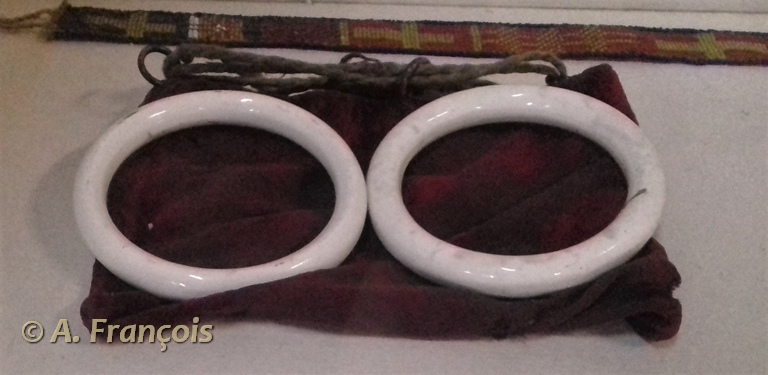
Anthropology
2 – metonarmband worn by men during chiefly ceremonies, traditionally made of troca shell
Anthropology
3 – hencearmband worn by men during chiefly ceremonies or dances, and derived from a sago palm
| Webwe i-vene i-wen' ne ma dapa; loko i-vio ne ma dapa; vilitoe i-vio ne viabasa dapa.dancersThey had armbands on their arms, scented leaves on their armbands; and white flowers in their hair. |
Sago-leaf armbands ✧ webwe
Webwe, li-le ne ngogoro li-la ba ote li-kamai; awoiu li-kai. Awoiu li-la kiñe tete peini ba ote ponu, awoiu ka li-vei webwe ñei. Li-vei awoiu, li-koene ne ma idi. Li-ovei pe li-la loko i-vio ene.
‘To make armbands, you go to the bush, find some sago palms (ba ote), and strip them into narrow bands. Then you take three of those bands, and weave them together into an armband. When it's finished, you can wear them on your arms. You can also stick loko leaves onto them.’
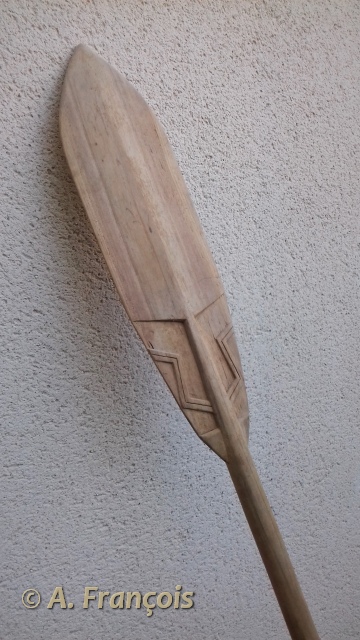
POc*pose
paddle, carved in wood
| In’ na i-waivo idi pe li-bo vilo, kuo ngatene nga pon, wele, ngaten’ abia pon na…He's the one who taught us how to create things with wood, how to cut canoes, how to make paddles, all those things… |
POc*qenop
Averb, intransitive
1 – s.o.lie down, be lying
| Ka i-mamei ponu ka i-maliawo ka i-wene teve.As she was feeling cold, she lit a fire and lay down beside it. |
| Van' ni-wene ni-botongo nara kape le-punuo ñi.I sleep on (my money) so nobody can steal it. |
| Nga mwaliko i-bu, le-iu ebele ini i-wene ne kie ini.When somebody dies, their body is buried [and lies] in a grave. |
2 – s.th.be located somewhere, in whatever position
| basa re po i-wen' iu rethe mountain that's lying over there |
| Okoro 'naka pon i-wene vele?So where's my knife? |
| Uña ngaten' enaka i-wene tev' iu re.My stuff (bags+) is up over there. |
| Kie dapa i-wene Paiu.Their graves are in Paiou. |
📘 Animate subjects take ~te ③.
Bsecond verb, intransitive
1 – resultative serialisations.th.be located somewhere after having be displaced. Usually not translated
| U-re i-wene!Leave that alone. [lit. you drop it, it lies] |
| La-wamu ne bonge iote i-wene pon.They hid (the treasure) in a cave. [lit. they hid it in a cave it's ‘lying’ there] |
| Ni-mui temamene 'none i-wene ne moe.I left behind my bag in the house. |
2 – actiongo ahead, go on
derivativei-wene i-wene
~wene moli (i·)wene moli
~wen’ moli
verb, intransitive
be-there unconstrainedbe easy (to s.o., teve)
| Piene adapa i-wen’ moli, i-aiae tae!Their language is easy, it's not difficult. |
| Ni-lengi i-wen' moli.It's very easy to understand. |
| Matapiene pon, i-wene moli teve dapa.That life was so easy for them. |
| Nganae le-ko l-ajau, i-wene moli teve dapa.Whatever they wanted to do, was easy to them. |
antonym~aiae
~wene teve (i·)wene teve
~wen’ teve
construction
be-there withbelong to ‹s.o.›. Forms possessive predicates equivalent to Eng. ‘have’
| Sitoa i-wene tev' ai' one.[a store existed with my father] My father had a business. |
| Nganae awa dapa i-viaene, na, i-wen' teve dapa.ParadiseWhatever they want, they have it. [lit. it's there with them] |
| Dapa noma, uro we tongolukilo peini ngaten’ motoro i-wen’ tev’ dapa.Our ancestors used [lit. had with them] magic soot and magic leaves for important matters. |
synonym~vio teve
2 – shoot ‹s.o., s.th.› with arrow
| Pe li-wete telupe, u-avi visone ka u-iui diro i-le i-wete ini.When you hunt [lit. shoot] pigeons, you bend your bow, and let the arrow fly and hit it. |
3 – pound ‹s.o., s.th.› with the end of a long stick, or any similar implement
| Vilisao i-abu i-abu i-wete toñaki ie Laperus pon i-metelu.The tornado came all the way down and pounded Lapérouse's ship, which sank immediately. |
Techniques
5 – in gardeningdig out ‹swamp taro, vivilo› by driving a digging stick into the ground; hence harvest
| Vivilo li-wete ñe ekuo, li-wete li-kamai.Swamp taros, we dig them out with the digging stick, and take them home. |
TechnAlocasia taros (vioe) are harvested by digging (Cf. ~ae ②); whereas Colocasia taros (jebute) are harvested by pulling (Cf. ~au ①).
6 – in cookingpound ‹taros, almonds+› in a bowl, using a long and heavy pestle
7 – grind ‹kava+› using a longish coral stone or a pestle
| Li-wete kava awoiu ka li-vili.After grinding the kava, we squeeze it. |
8 – pin ‹clothes, leaves+› using a needle or a small pointed stick
~wo1 (i·)wo verb, intransitive
run away, escape (from, mina)
| P-aiu pe-wo pe-le ne ngogoro!Get up and run away to the bush! |
| Ba-wo etapu!Don't run away! |
carry ‹basket, net+› on o.'s back, hanging from a strap put around forehead
| Ni-wo topola 'none ne die 'ne.I'm carrying my bag on my back (hanging on my forehead). |
📘 This way of carrying is typically used when coming back home from the gardens, whether to carry firewood or harvested food.
see lexical list at~labu
~wo3 (i·)wo verb, transitive
~wo4 (i·)wo verb, intransitive
POc*puaq
plantbear fruit
| Udo ono pe a-vo ka i-wo.The banana trees which you planted have already borne their fruits. |
| Vewo, basavono na mamote i-wo tae.The chestnuts haven't borne fruit yet. |
1 – stick ‹long object: knife+› into s.th.; thrust, drive in
| Li-woi okoro ñe utedie ini.They stuck a knife in his back. |
3 – put up, erect ‹post+› by sticking it in ground
| Blateno ponu li-woi ne mane.They have put up the ritual posts on the dancing area. |
| Dapa li-woi nuduro ne touro.They put up taboo signs (nuduro) on the seashore. |
synonym~vo ②
4 – bang ‹body part› with a shock
| Men' one i-tabau i-woi visibaele ini ne touro.My son fell down and hurt his knee on the reef. |
| Ni-woi basa ene li-asai.I banged by head, and it was stitched up. |
5 – bang ‹heavy object› with a noise
| ~woi okoro pound bamboos on the ground, to make music |
synonym~wete
~woi okoro (i·)woi okoro verb-object idiom
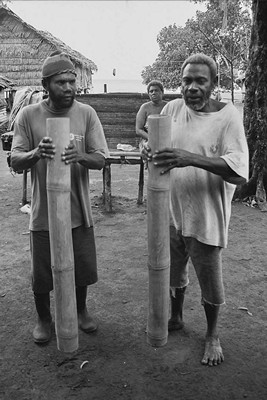
Music
pound bamboospound heavy bamboos vertically and repeatedly onto the ground, to mark bass rhythms while singing
| Kape ba-woi okoro, bai-oburo ne mane.We shall pound the bamboos and sing songs, in the dancing area. |
📘 Bamboos are especially played that way in a musical genre called buro bula okoro ‘songs for bamboos’. A handful of musicians are lined up in the centre of the village area (mane); as they pound the bamboos, they sing songs, to the sound of which the dancers dance around them.
Cf. iote ‘other; Indefinite’
wolowolo wolowolo noun
Motawolowoloacross; a cross
Christianity
a Christian cross
| Li-vesu wolowoloerect a cross |
| Ngiro i-aka ponu ra ka i-vokoiu wolowolo pon, i-vokoiu ka i-tabau.The hurricane blew so hard that it destroyed the cross, and brought it down. |
POc*maŋanfeed
give food to, feed ‹man, animal›
| Poi pe li-womanga ne kulumoe, vao i-moloe ne ngogoro.Domesticated pigs are fed in the village, but wild pigs wander about in the forest. |
pe li-womanga phrase
animal(one) which is fedtame, domestic
| Vao, we pe li-womanga?Is (this animal) wild, or tame? |
antonymvao
womoe womoe noun
Architecture
purlin: horizontal beam in the roof structure, situated half way up, between the stringpiece and the ridge beam (pumene)
📘 There are normally two such purlins on each side of the roof.
Pl. of pine
1 – plural senses.th.big, large (and numerous)
| Ka ba wopine ponu!Look at those huge (taro) stalks! |
| ule uie wopine k.o. vine with large leaves |
2 – s.o.older, adult (and numerous)
| Daviñevi wopine li-ovei pe li-anu kava.Adult women are allowed to drink kava. |
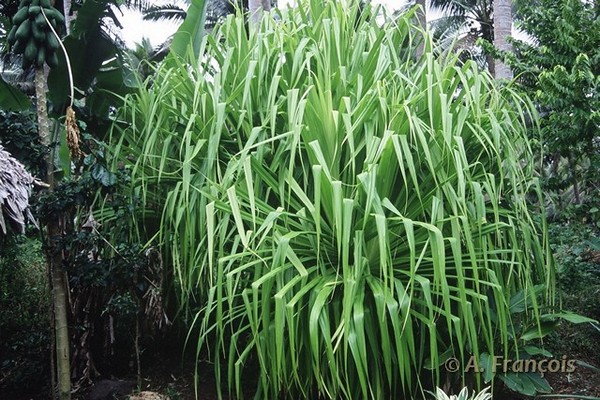
| Dapa noma, li-ovei pe li-loko uie woubo pe le-vei bavede peini.People before used to weave sails out of pandanus leaves. |
~wowo2 (i·)wowo verb, intransitive
swim
| Dapa kula ka li-bu ne revo, dapa kula li-wowo li-koie ne kulumoe.Some of them died in the sea, some others swam till they reached the island. |
| Li-wowo ñe viko iadapa.They swam with their treasures. |
plant ‹tuber, esp. yam› in the ground
| li-wowo uoyam planting |
| None pon, ini ñepe pe i-ta, pe li-wowo tae.This kind of yam grows on its own, it is not planted. |
see~teli
